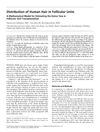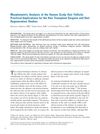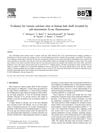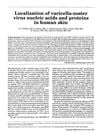99 citations,
July 2005 in “Ultramicroscopy” The research improved understanding of hair and skin properties across different ethnicities and conditions.
[object Object]  83 citations,
April 1999 in “Dermatologic Surgery”
83 citations,
April 1999 in “Dermatologic Surgery” The research found that for a typical hair density, about 11 square centimeters of donor scalp is needed to get 800 hair grafts for transplantation.
72 citations,
March 2013 in “Primates” More research is needed to understand how diet affects isotope signatures in Japanese macaque tissues.
 60 citations,
January 2014 in “Anais Brasileiros De Dermatologia”
60 citations,
January 2014 in “Anais Brasileiros De Dermatologia” Nanotechnology in dermatology shows promise for better drug delivery and treatment effectiveness but requires more safety research.
 57 citations,
May 2014 in “Molecular Phylogenetics and Evolution”
57 citations,
May 2014 in “Molecular Phylogenetics and Evolution” The research found how GPCR Class A Rhodopsin receptors are related and suggested possible substances they interact with.
 52 citations,
June 2013 in “The Journal of Clinical Endocrinology and Metabolism”
52 citations,
June 2013 in “The Journal of Clinical Endocrinology and Metabolism” The research found that anovulatory young women have higher androgen and hormone levels than those who ovulate, suggesting immature hormonal regulation rather than a specific condition.
 51 citations,
November 2010 in “Dermatologic Surgery”
51 citations,
November 2010 in “Dermatologic Surgery” The research provides specific measurements for hair follicles that can improve hair transplant and regeneration techniques.
 47 citations,
August 2014 in “The Journal of Clinical Endocrinology and Metabolism”
47 citations,
August 2014 in “The Journal of Clinical Endocrinology and Metabolism” The research suggests that the global distribution of PCOS is likely due to historical human migration and that genes affecting PCOS may have different impacts on males and females.
 42 citations,
September 2007 in “The Journal of Clinical Endocrinology and Metabolism”
42 citations,
September 2007 in “The Journal of Clinical Endocrinology and Metabolism” The research found that polycystic ovary syndrome (PCOS) has two distinct types, with one having more severe hormone and insulin issues.
40 citations,
October 2012 in “Dermatologic clinics” More research is needed to understand the genetic causes of Alopecia areata to develop better treatments.
 36 citations,
March 2019 in “European Journal of Human Genetics”
36 citations,
March 2019 in “European Journal of Human Genetics” The research found genetic differences in identical twins that could explain why one twin has a disease while the other does not.
 35 citations,
March 2007 in “Skin Research and Technology”
35 citations,
March 2007 in “Skin Research and Technology” The conclusion is that exogen is a unique hair cycle phase and the new sampling method specifically targets this stage, which may help in future hair loss research.
 34 citations,
February 2012 in “Journal of Cutaneous Pathology”
34 citations,
February 2012 in “Journal of Cutaneous Pathology” The research found specific signs to diagnose alopecia areata incognito and noted patients generally regrow hair after steroid treatment.
 31 citations,
January 2017 in “Phytotherapy Research”
31 citations,
January 2017 in “Phytotherapy Research” Ziziphus jujuba Mills may have health benefits, but more research is needed to confirm its safety and effectiveness.
 31 citations,
January 2010 in “GenomeBiology.com (London. Print)”
31 citations,
January 2010 in “GenomeBiology.com (London. Print)” The research concluded that selection significantly shaped the genetic variation of the X chromosome, with certain regions affected by past selective events.
 31 citations,
December 2002 in “Biochimica et biophysica acta. G, General subjects/Biochimica et biophysica acta. General subjects (Online)”
31 citations,
December 2002 in “Biochimica et biophysica acta. G, General subjects/Biochimica et biophysica acta. General subjects (Online)” The research found two types of calcium in human hair, one that varies among individuals and another that is consistent across people.
 30 citations,
January 2016 in “Journal of Pharmaceutical and Biomedical Analysis”
30 citations,
January 2016 in “Journal of Pharmaceutical and Biomedical Analysis” The research found different metabolism changes in PCOS patients and suggested new potential markers for diagnosing PCOS with or without insulin resistance.
[object Object]  29 citations,
January 2021 in “Translational Psychiatry”
29 citations,
January 2021 in “Translational Psychiatry” The research suggests that Tourette syndrome is linked to both brain signaling and immune system pathways.
 29 citations,
February 2018 in “Genetics research international”
29 citations,
February 2018 in “Genetics research international” Certain genetic variations are linked to increased androgen levels in PCOS, but more research is needed to understand these connections fully.
29 citations,
October 2017 in “Journal of proteomics” The research found specific proteins that affect fiber characteristics and hair growth in sheep and goats.
 27 citations,
September 2018 in “Nanomedicine: Nanotechnology, Biology and Medicine”
27 citations,
September 2018 in “Nanomedicine: Nanotechnology, Biology and Medicine” Further research is needed to improve hair regeneration using stem cells and nanomaterials.
 27 citations,
April 2017 in “European journal of endocrinology”
27 citations,
April 2017 in “European journal of endocrinology” The research found that MRI and certain hormone levels can help tell apart ovarian tumors from hyperthecosis in postmenopausal women, but tissue analysis is still needed for a definite diagnosis.
 26 citations,
August 2020 in “Dermatology Research and Practice”
26 citations,
August 2020 in “Dermatology Research and Practice” COVID-19 can cause various skin problems, including reactions to protective gear and medication, with different rates reported worldwide, and more research is needed to fully understand these skin issues.
26 citations,
June 2003 in “Obstetrics and gynecology clinics of North America” More research is needed to understand the long-term benefits of insulin-sensitizing drugs for treating adolescents with PCOS.
 25 citations,
December 1995 in “Neurology”
25 citations,
December 1995 in “Neurology” The research found that chickenpox virus spreads in skin through blood then to skin cells, while shingles virus moves from nerves to hair follicle areas before infecting skin cells.
 24 citations,
October 2014 in “Cold Spring Harbor Perspectives in Medicine”
24 citations,
October 2014 in “Cold Spring Harbor Perspectives in Medicine” Genetic research has advanced our understanding of skin diseases, but complex conditions require an integrative approach for deeper insight.
 23 citations,
May 2016 in “American Journal of Pathology”
23 citations,
May 2016 in “American Journal of Pathology” The research suggests that a specific skin gene can be controlled by signals within and between cells and is wrongly activated in certain skin diseases.
 22 citations,
April 2006 in “Journal of The American Academy of Dermatology”
22 citations,
April 2006 in “Journal of The American Academy of Dermatology” More research is needed to determine if iron deficiency causes hair loss.
 21 citations,
June 2017 in “Journal of The American Academy of Dermatology”
21 citations,
June 2017 in “Journal of The American Academy of Dermatology” Topical DPCP is somewhat effective for hair loss in alopecia areata, but more research is needed.
 20 citations,
June 2019 in “Experimental Dermatology”
20 citations,
June 2019 in “Experimental Dermatology” The research suggests that autophagy-related genes might play a role in causing alopecia areata.
























